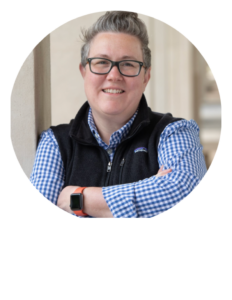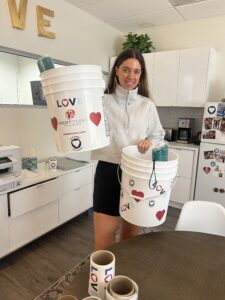

Locus enables OHHF to offer a wide variety of accomplished clinicians to assist in therapies for patients and their families. Using music therapy is particularly important in a young population that may not have all the words or ability to put talk therapy to use yet. Music is a universal language that is used to teach patients calming techniques, to put words to frustrations, and to express how they are feeling through sound. Children with CHD often wear a Berlin Heart device that acts as an external pacemaker for their hearts while they wait for a transplant. Patients wearing these devices go through weekly sterile dressing changes that can be traumatic. Incorporating music therapy as an automatic referral during these appointments has made a huge difference.
“These kids need autonomy; they are so used to having procedures and enduring the journey that is not their choice. Giving them the ability to play a harmonica behind a sterile veil while I gown and glove up with them allows for some emotional freedom. The Harmonica is a favorite because the kids can make music to express frustration while also filling their lungs and doing some deep breathing. Adding an option to have participatory music therapy during a dressing change allows the child to really focus their attention elsewhere and most do not require as much pain medication as a result,” says Merrell.
OHHF has set up a bundle of instruments that is sent to the kids in the music therapy program, making music accessible and fun activity for the participants. Allowing siblings to also participate has been valuable for Merrell as well. “The sibling relationship changes when one child needs all the attention from parents and family members. Giving siblings either individual or group time with brothers or sisters allows them some normalcy to laugh, express themselves and relieve the tension in the family unit.”
Merrell shares another experience, “I have one child who was able to vent her anger at the lack of autonomy by screaming her ABC’s song and dance around like she was at a metal concert. It was wonderfully cathartic.” Giving patients options to have these therapies virtually through Locus helps to close the gap between providers and patients when therapies and services are not available. Many CHD families don’t live in metropolitan areas where there might be several music therapists to choose from. Giving access through virtual care is a real game changer for a lot of these families. “OHHF does fabulous work allowing us to provide therapy to any client who needs it regardless of location,” says Merrell. “I love what I do and the difference it makes.”
If you are interested in learning more about the Ollie Hinkle Heart Foundation (OHHF), please click here.
If you are interested in learning more about Christy Merrell’s work, please click here.
